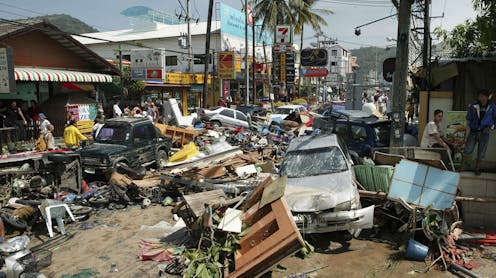Terrorists weigh risks to their reputation when deciding which crises to exploit − new research
- Written by Seden Akcinaroglu, Professor of Political Science, Binghamton University, State University of New York
 Terrorists tend not to exploit humanitarian disasters, such as the 2004 tsunami that caused devastation across Thailand and Indonesia.AP Photo/Karim Khamzin
Terrorists tend not to exploit humanitarian disasters, such as the 2004 tsunami that caused devastation across Thailand and Indonesia.AP Photo/Karim KhamzinTerrorist attacks are more common during security and economic crises, but they decrease during humanitarian disasters.
That’s the main finding of our in-depth analysis of global data from 1980 to 2014. Looking at incidents of terrorist attacks during that time period across 169 countries, we discovered that perpetrators focus on what we call “ripe moments” – circumstances that present unique opportunities for terrorist groups to attack when the state is distracted or weakened.
But the reason why a state may be vulnerable matters to terrorists – opportunities that come with a greater “reputation risk” are exploited less frequently, our study shows.
We split ripe moments into three crises categories: security, economic and humanitarian.
Security crises, such as wars or threats from rival states, absorb a state’s attention and military resources. This creates internal vulnerabilities, and terrorist attacks become more likely.
Similarly, economic crises divert governmental resources toward financial recovery, eroding bureaucratic and military effectiveness. This also reduces the state’s ability to monitor and counter terrorist threats. Again, we found a clear uptick in terrorist attacks.
In contrast, humanitarian crises − especially natural disasters − trigger a different response. Despite the state being in a weakened state, terrorist activity tends to decrease significantly.
Our findings show that the chances of a terrorist attack taking place rise significantly – from 35 a year to 57 – as a security crisis escalates from low hostility to interstate war, and rise by 1.5 times during financial crises. In contrast, humanitarian crises correspond with a dramatic drop in predicted attacks, plummeting from 43 to less than 1.
The main difference in the three crises − security, economic and humanitarian − is not the state’s vulnerability but rather the reputational risks involved with exploiting that weakness.
And this supports our core theory going into the study: Terrorist groups act strategically, balancing the benefits of exploiting a crisis against the potential reputational fallout.
Indeed, rather than exploit humanitarian disasters to attack, armed groups use them to win over local populations. For example, during Turkey’s 1999 earthquake, the Kurdistan Workers’ Party – a group designated as “terrorist” by Turkey and the U.S. – not only refrained from attacking but also offered support and blood donations. Likewise, the Free Aceh Movement in Indonesia declared a ceasefire and provided aid during the 2004 tsunami.
In these cases, the reputational costs of attacking during a disaster outweighed any perceived benefits. Groups feared alienating their domestic supporters, harming future recruitment or jeopardizing negotiations with the state.
Why it matters
These findings challenge the simplistic narrative that armed groups attack whenever a state is vulnerable.
Instead, armed groups demonstrate calculated restraint based on how their actions will be perceived by the population at large.
This, we believe, has profound implications for how governments can respond to and prepare for terrorism. Understanding the reputation-opportunity trade-off can help governments refine their crisis management and counterterrorism strategies.
For example, policymakers should not automatically assume heightened terrorism risk during every crisis. Recognizing this nuance could lead to better allocation of security resources and more effective diplomatic responses.
Our study also underscores the importance of media and public perception. During humanitarian crises, public empathy and unity make violent acts particularly repugnant.
This sentiment extends across ethnic, political and national lines. Armed groups are keenly aware of this and often act accordingly. Therefore, positive public diplomacy and transparent crisis management can serve as deterrents to terrorism.
What we plan to do next
While our findings are robust and point to clear conclusions, there are still questions to explore. One major area for future research is the internal decision-making processes of terrorist groups: How do leaders of such groups assess reputational risks? And what role do rank-and-file members play in attack decisions, especially during crises?
We would also like to explore how third-party sponsors – Iran, for example, in regards to its proxy axis of resistance – influence terrorist behavior during crises. External actors might pressure groups to show restraint or, conversely, to escalate violence.
The degree to which these sponsors value the reputations of their proxies may shape group actions in unpredictable ways.
We would like to follow up our study by looking at other moments besides disasters that influence terrorist groups’ decisions due to reputational concerns.
Ultimately, we hope our research opens the door to a more sophisticated understanding of terrorist behavior.
The Research Brief is a short take on interesting academic work.
The authors do not work for, consult, own shares in or receive funding from any company or organization that would benefit from this article, and have disclosed no relevant affiliations beyond their academic appointment.
Authors: Seden Akcinaroglu, Professor of Political Science, Binghamton University, State University of New York

